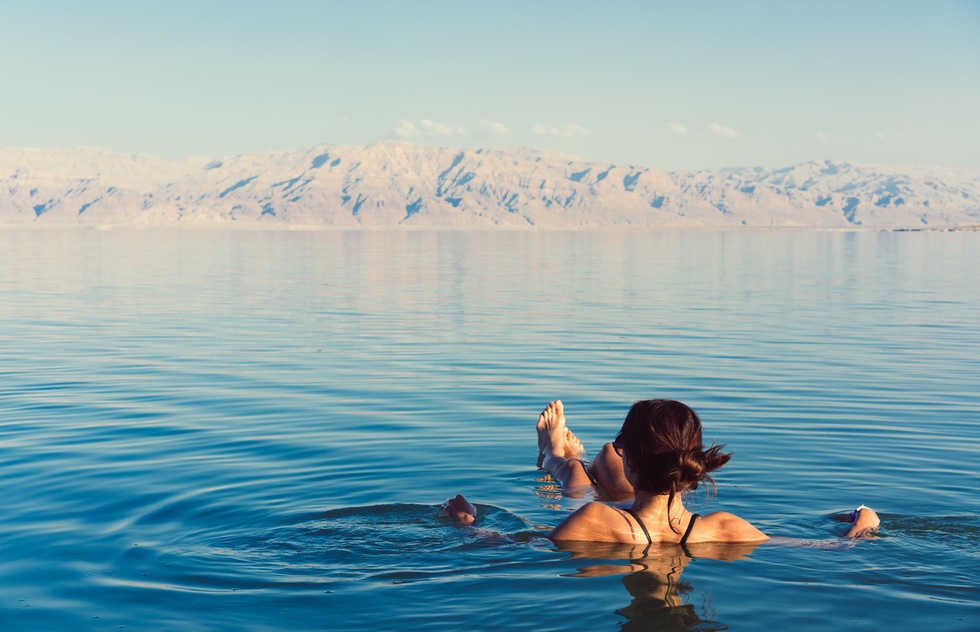The Dead Sea is by far the lowest point on the face of the planet, the earth's most unworldly body of water. The northern coast along Hwy. 1 is the most beautiful, but it's farther south, near Ein Gedi and the hotels of Neve Zohar and Ein Bokek, that the water is most dense and believed to be very helpful for skin diseases such as psoriasis. These were Cleopatra's favorite waters for her beauty needs, and today the waters (and the mud) are said to be cleansing for the skin and scalp, improving skin texture and even smoothing wrinkles.
Experts came out here in the 1960s, had the waters analyzed by Hadassah technicians, and found that they contained the highest mineral content of any waters in the world: 300 grams per liter. As you bathe in The Dead Sea waters, you'll also be breathing the denser air of the below-sea-level atmosphere, which contains more than 10% more oxygen than at sea level. This is helpful for people with respiratory problems and heart disease. In addition, bromides evaporating into the air from the surface of The Dead Sea contribute to a relaxed feeling of well-being. It's not enough to space you out, but when tired or anxious people come here for a week, the atmosphere seems to help them unwind. The dense atmosphere also filters out harmful sun rays -- psoriasis sufferers can stay out in the sun a bit longer without burning. At the area's hotels and spas, experts will tailor their treatment baths to your specific ailment. If you want a planned spa treatment, though, you'll have to have a medical okay. You can be examined by a resident physician, but a doctor's note certifying that your blood pressure can stand the stimulation of the waters and massage programs will suffice. In order to really get any benefit from The Dead Sea spas, you must stay here for at least 1 or 2 weeks. The four- and five-star hotels at Ein Bokek, though expensive, are the best way to really do an intensive program of spa treatments. Tip: An alternative to the big hotels is Kibbutz Ein Gedi's beautiful holiday village, on a hill overlooking The Dead Sea. Ein Gedi has its own beach area, and guests can use Ein Gedi's Sulfur Springs and Spa.
Getting There
By Tour Bus-Public transport is difficult and infrequent, especially in the blazing summer weather. Both Egged and United Bus Tours run affordable half-day and full-day tours to Masada and the Dead Sea, usually allowing time for a quick dip and brief stops along the way at interesting sites and vista points. Although convenient, just note that the tour buses can spend a big chunk of time collecting passengers at various hotels and drop off points in Jerusalem before heading out. Abraham Tours, run by Jerusalem’s Abraham Hostel also operates bus tours to the area; check with them about middle of the night departures for hikers who want to climb to the top of Masada in the cool, pre-dawn hours and catch the sunrise (a cable car carries non-climbing visitors up to Masada after 8am).
By Car-A rental car allows you to explore at your leisure and make an overnight trip. There are parking lots at Ein Gedi Beach, and at all historic sites and nature reserves along the way. From Jerusalem take Hwy. 1, east to its intersection with Hwy. 90. Turn right (south) onto Hwy. 90 (the main road along the coast of The Dead Sea) and continue following the signs to Qumran, Ein Gedi, and Masada. Highway 1 from the heights of Jerusalem to the Dead Sea (1200 feet below sea level) is a steady 4000 foot downhill run. Along the way, you’ll pass black goat hair Bedouin tent encampments, and a sign noting that you’ve passed sea level.
What to See & DoVisitors come here, primarily, to look, float and repair. The Dead Sea contains the highest mineral content of any waters in the world: 300 grams per liter. As you bathe in The Dead Sea, you’ll also be breathing the dense air of the below-sea-level atmosphere, which contains over 10 percent more oxygen than at sea level. This is helpful for people with respiratory problems and heart disease. In addition, bromides evaporating into the air from The Dead Sea contribute to a relaxed feeling of well being. Many tired and anxious people come here for at least a week in order to unwind. The dense atmosphere also filters out harmful sun rays—psoriasis sufferers can stay out in the sun a bit longer without burning. Large tour groups and long-term residents fill the area’s rows of high-rise, all-inclusive hotels and spas—therapeutic colonies that don’t really give you a feel for Israel. An alternative to the big hotels is Kibbutz Ein Gedi’s beautiful holiday village, in an amazing desert botanical garden on a hill overlooking the Dead Sea.
Note: Because the Dead Sea is drying up and water levels are falling, many of the Dead Sea spa hotels that once enjoyed beachfronts, now find themselves as much as a quarter of a mile from the water line. Sinkholes caused by the falling underground water table have become a recent danger around the region. Do not venture into areas that are barricaded off or marked as dangerous.









